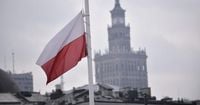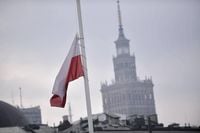In a solemn declaration, President Andrzej Duda announced a national mourning period in Poland following the death of Pope Francis. The day of mourning will coincide with the Pope's funeral, scheduled for Saturday, April 26, 2025. This decision marks a significant moment in Polish history, as it reflects the nation's deep respect and sorrow for the loss of a prominent global figure.
Pope Francis passed away on April 21, 2025, at 7:35 AM, at the age of 88, due to complications from a stroke and cardiac arrest. His death has prompted an outpouring of grief not only in Poland but around the world, highlighting his role as a spiritual leader and advocate for peace.
According to Wojciech Kolarski, head of the Presidential Bureau of International Policy, the national mourning will be observed from midnight on the night of April 25 to midnight on April 27. Duda, along with his wife Agata Kornhauser-Duda, will attend the funeral ceremonies, which will commence at 10:00 AM in St. Peter's Square in the Vatican.
In Poland, national mourning is a formal recognition of collective grief and is typically declared by the president through a regulation that requires the countersignature of the Prime Minister. This particular mourning period is the 20th such declaration in the Third Polish Republic, a testament to the significance of the event.
During national mourning, flags are lowered to half-mast, and while there is no official ban on business activities, the day is marked by a sense of reflection and respect. Public institutions, including government offices and schools, remain open, and there is no prohibition against hosting private events such as weddings. However, many couples may choose to modify their celebrations out of respect for the occasion.
The Prime Minister has the authority to cancel public entertainment events during this period. In light of the Pope's passing, events such as concerts and sporting competitions may be postponed or canceled. For instance, the Warsaw celebrations planned for the 1000th anniversary of the Polish Crown have been rescheduled to the following Sunday, April 27, 2025.
National mourning serves as a reminder of the cultural and historical significance of the events that prompt such declarations. In the past, Poland has observed national mourning for various reasons, including the deaths of notable figures like Pope John Paul II and tragic events such as the Smolensk disaster in 2010.
While there are no legal penalties for individuals who choose to disregard the mourning period, societal expectations dictate a level of decorum that aligns with the gravity of the situation. Citizens are encouraged to engage in respectful practices, such as refraining from loud celebrations or entertainment that could disturb the peace of mourning.
As Poland prepares to mourn the loss of Pope Francis, the nation reflects on the impact of his leadership and the values he championed. His legacy is one of compassion, dialogue, and a commitment to addressing the pressing issues of our time.
The funeral of Pope Francis will be a historic event, as he will be buried in the Basilica of St. Mary Major, marking a departure from the tradition of papal burials within the Vatican Grottos. This choice reflects his unique journey and the personal significance of the location, which is one of the oldest papal basilicas.
In conclusion, the national mourning declared by President Duda is not just a formal procedure; it is a heartfelt acknowledgment of the profound loss felt by many. As the date approaches, Poland stands united in remembrance, honoring a leader whose influence extended far beyond its borders.










